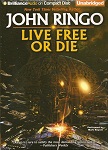
 Live Free Or Die
Live Free Or Die
By John Ringo; Read by Mark Boyett
17 Hours – [UNABRIDGED]
Publisher: Brilliance Audio
Published: 2010
Themes: / Science Fiction / Military / Politics / Aliens / First contact /
All authors have political opinions. Those opinions reveal themselves in authors’ novels. Most authors reveal those opinions subtly, probably figuring an in-your-face approach will only turn off some readers.
John Ringo is not most authors. In Troy Rising: Live Free or Die, Ringo (and his Mary Sue protagonist, named Tyler Vernon) wear their politics on their sleeves. It is a robust libertarian brand of politics. This is a little refreshing, and a lot distracting. Readers who dislike celebrations of conservative culture and Don’t Tread On Me economics are going to have to work very hard to ignore the constant needling. In particular, “socialist p***ies” are urged to approach this novel with deflector shields set to maximum.
Even plot points fulfill Ringo’s wishes in surprising ways. When aliens drop rocks on our cities, the result is that the surviving electorate skews rural. . .and conservative. This is just the kind of thinking-through-the-implications work that a good speculative fiction author is required to do. Yet, Ringo takes just a tiny bit of, well, satisfaction from the deaths of millions of misguided liberal urbanites. More blatantly self-indulgent is a plot point involving an alien-engineered virus that makes all the blond women in the world soooper horny. No joke.
You can call this space opera; ear candy; action-packed. The prose is breezy and the plot is intelligently constructed. The narration, by Mark Boyett, is a pleasure to listen to. He’s either an enthusiastic conservative, or a liberal with superb acting skills. (Either scenario is plausible.)
The novel divides into three clear sections. The first act describes a first-contact scenario, with aliens installing an interstellar transport gate in our solar system with precious little warning. The resulting transformation of all human civilization into a galactic third-world country is quite plausible. It’s a disturbing reminder of the way colonial powers are viewed by the colonized.
The second act tells of the ascendancy of Tyler Vernon from unemployed everyman to the richest tycoon in human history. He finds the one commodity unique to Earth that aliens value. Here, the novel becomes less plausible—a little silly, really—and worse, the idea is not original, resembling a plot device in Harry Turtledove’s WWII alt history, where gingerroot turns aliens into crackheads. I won’t give away what the substance is in this case; suffice it to say it comes from a region of the world known for its culture of prickly independence, which dovetails with Ringo’s politics with neat precision. A nifty authorial trick, that.
The third act is the longest, and it describes the building the Troy, an excellent Big Dumb Object—a fantastically massive battle station. Even more impressive is a system of mirrors that concentrate sunlight into powerful beams measured in terawatts or even petawatts. These weapons give Earth a fighting chance against the oppressors. The question nags: could humans think up technology that surprises millennia-old civilizations? Very unlikely.
This book brings to mind another tale of lowly humans besting an established galactic order. Poul Anderson’s The High Crusade describes how medieval knights commandeer an alien space ship and, ultimately, overthrow a space empire. That book is more enjoyable because it’s not even remotely serious. Live Free or Die aspires to a more serious level, but ultimately works only if the reader’s sense of fun can withstand the concentrated sunlight of plausibility.
Posted by the Fredösphere
You know, it’s funny. Reviews of books like this, and, say, Tom Kratman’s stuff, always feel the need to warn the potential readers about the politics. And yet stuff that’s equivalently in your face from a left-wing perspective, like the abysmally bad “Little Brother” by Cory Doctorow don’t feel the need to mention it at all. I wonder why that is?
Probably because they are by different reviewers.
Ringo isn’t conservative. He’s libertarian with certain conservative tendencies. There’s a big difference, although usually the “subtle” clues like wanting drugs legalized, tons of meaningless sex, or hostility to standard social or religious structures kinda give it away. With your eyes closed. From the other side of the planet. (For example, Jim Baen.)
Nobody writes conservative sf/f. The few writers who start out that way decide to try to be “edgy” instead. Of course, what would be edgy in today’s publishing industry would be to write something conservative, but there you go.
Well, no need to wonder whether I should forgive Ringo for that Ghost crap. Honest to goodness, it’s amazing how completely that sf/f fulfills Sturgeon’s Law every year. My only consolation is that urban fantasy/paranormal romance manages to stretch that to 99.999% of everything is crap.
I’m reading through the third book in this series (and am so far rather disappointed in the fact that 300 pages in, it’s mostly been about the perceived idiosyncrasies and shortcomings of South-American culture), but for the most part, I have found the series an incredibly enjoyable read.
That being said, I was mentioning to a friend how you can often get a feel for an author’s political views from their writing. I was only half-joking when I mentioned that the vibe I was getting from Ringo’s books was Neo-Nazi.
Still, good read.